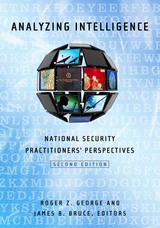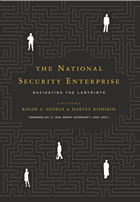
Analyzing Intelligence, now in a revised and extensively updated second edition, assesses the state of the profession of intelligence analysis from the practitioner's point of view. The contributors—most of whom have held senior positions in the US intelligence community—review the evolution of the field, the rise of new challenges, pitfalls in analysis, and the lessons from new training and techniques designed to deal with 21st century national security problems. This second edition updates this indispensable book with new chapters that highlight advances in applying more analytic rigor to analysis, along with expertise-building, training, and professional development. New chapters by practitioners broaden the original volume’s discussion of the analyst-policymaker relationship by addressing analytic support to the military customer as well as by demonstrating how structured analysis can benefit military commanders on the battlefield.
Analyzing Intelligence is written for national security practitioners such as producers and users of intelligence, as well as for scholars and students seeking to understand the nature and role of intelligence analysis, its strengths and weaknesses, and steps that can improve it and lead it to a more recognizable profession.
The most comprehensive and up-to-date volume on professional intelligence analysis as practiced in the US Government, Analyzing Intelligence is essential reading for practitioners and users of intelligence analysis, as well as for students and scholars in security studies and related fields.

Drawing on the individual and collective experience of recognized intelligence experts and scholars in the field, Analyzing Intelligence provides the first comprehensive assessment of the state of intelligence analysis since 9/11. Its in-depth and balanced evaluation of more than fifty years of U.S. analysis includes a critique of why it has under-performed at times. It provides insights regarding the enduring obstacles as well as new challenges of analysis in the post-9/11 world, and suggests innovative ideas for improved analytical methods, training, and structured approaches.
The book's six sections present a coherent plan for improving analysis. Early chapters examine how intelligence analysis has evolved since its origins in the mid-20th century, focusing on traditions, culture, successes, and failures. The middle sections examine how analysis supports the most senior national security and military policymakers and strategists, and how analysts must deal with the perennial challenges of collection, politicization, analytical bias, knowledge building and denial and deception. The final sections of the book propose new ways to address enduring issues in warning analysis, methodology (or "analytical tradecraft") and emerging analytic issues like homeland defense. The book suggests new forms of analytic collaboration in a global intelligence environment, and imperatives for the development of a new profession of intelligence analysis.
Analyzing Intelligence is written for the national security expert who needs to understand the role of intelligence and its strengths and weaknesses. Practicing and future analysts will also find that its attention to the enduring challenges provides useful lessons-learned to guide their own efforts. The innovations section will provoke senior intelligence managers to consider major changes in the way analysis is currently organized and conducted, and the way that analysts are trained and perform.

Recent breakdowns in American national security have exposed the weaknesses of the nation’s vast overlapping security and foreign policy bureaucracy and the often dysfunctional interagency process. In the literature of national security studies, however, surprisingly little attention is given to the specific dynamics or underlying organizational cultures that often drive the bureaucratic politics of U.S. security policy.
The National Security Enterprise offers a broad overview and analysis of the many government agencies involved in national security issues, the interagency process, Congressional checks and balances, and the influence of private sector organizations. The chapters cover the National Security Council, the Departments of Defense and State, the Office of the Director of National Intelligence, the Central Intelligence Agency, the Federal Bureau of Investigation, the Department of Homeland Security, and the Office of Management and Budget. The book also focuses on the roles of Congress, the Supreme Court, and outside players in the national security process like the media, think tanks, and lobbyists. Each chapter details the organizational culture and personality of these institutions so that readers can better understand the mindsets that drive these organizations and their roles in the policy process.
Many of the contributors to this volume are long-time practitioners who have spent most of their careers working for these organizations. As such, they offer unique insights into how diplomats, military officers, civilian analysts, spies, and law enforcement officials are distinct breeds of policymakers and political actors. To illustrate how different agencies can behave in the face of a common challenge, contributors reflect in detail on their respective agency’s behavior during the Iraq War.
This impressive volume is suitable for academic studies at both the undergraduate and graduate level; ideal for U.S. government, military, and national security training programs; and useful for practitioners and specialists in national security studies.

This second edition of The National Security Enterprise provides practitioners’ insights into the operation, missions, and organizational cultures of the principal national security agencies and other institutions that shape the US national security decision-making process. Unlike some textbooks on American foreign policy, it offers analysis from insiders who have worked at the National Security Council, the State and Defense Departments, the intelligence community, and the other critical government entities. The book explains how organizational missions and cultures create the labyrinth in which a coherent national security policy must be fashioned. Understanding and appreciating these organizations and their cultures is essential for formulating and implementing it. Taking into account the changes introduced by the Obama administration, the second edition includes four new or entirely revised chapters (Congress, Department of Homeland Security, Treasury, and USAID) and updates to the text throughout. It covers changes instituted since the first edition was published in 2011, implications of the government campaign to prosecute leaks, and lessons learned from more than a decade of war in Afghanistan and Iraq. This up-to-date book will appeal to students of US national security and foreign policy as well as career policymakers.
READERS
Browse our collection.
PUBLISHERS
See BiblioVault's publisher services.
STUDENT SERVICES
Files for college accessibility offices.
UChicago Accessibility Resources
home | accessibility | search | about | contact us
BiblioVault ® 2001 - 2024
The University of Chicago Press









